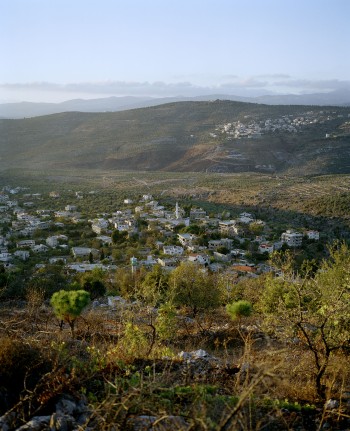Akram Zaatari
In this sober and studied show at Sfeir-Semler Gallery, Hamburg, and Beirut Art Center, the Lebanese artist engages with secret histories, revisited memories and personal lives
In this sober and studied show at Sfeir-Semler Gallery, Hamburg, and Beirut Art Center, the Lebanese artist engages with secret histories, revisited memories and personal lives
Recto-verso photographs of political prisoners against kitschy, flowered backdrops captured from the originals; photographs of letters written and decorated by a certain Nabih Awada (a.k.a Neruda, an ex-communist party resistance fighter who spent ten years in Israel’s Askalan Prison); photographs of both a private collection of cassette tapes and bombings on the hills of Saida, Lebanon in the 1980s – this is the intimate material that makes up Akram Zaatari’s solo exhibition ‘Earth of Endless Secrets: Writing for a Posterior Time’, currently split between the Beirut Art Center and Sfeir-Semler Gallery.

In this sober and studied show, Zaatari engages with the stuff of secret histories, revisited memories and personal lives. Through new series of photographic and video works – such as ‘Untold’ (2008), ‘Neruda’s Garden’ (2009) and ‘Learning Photography’ (2009) – Zaatari not only reconstructs a certain period in the history of the leftist resistance in South Lebanon, he also returns to some of his own earlier work. Showing photographs of existing photos and letters – documents of documents – in order to narrate Awada’s imprisonment during the ‘90s, and revisiting his video works such as All is Well on the Border (1997) and This Day (2003), Zaatari attempts to weave this loaded political history through both fiction and the seemingly banal elements of his and Awada’s everyday lives.

‘Earth of Endless Secrets’ performs the difficulties of directly accessing the histories and testimonies of war, occupation and resistance. Though due partly to logistical constraints, holding the exhibition in separate venues (between which there are formal parallels) enacts how fractured histories only become knowable once the impossibility of accessing them is acknowledged. Although, in some instances ‘Earth of Endless Secrets’ emanates a kind of flattening effect whereby a fraught history is organized into too clean-cut terms, the gestures of secret letters and testimonial remains also, however, makes Zaatari’s interventions seem akin to arranging fossils (images of found shells, the capsule letter, the bombed-out hills he shot as a teenager, even the fictive videos, all act like imprints). They do this without making lofty, authoritative claims.
Zaatari’s 32-minute video, Letter to Samir (2008), foregrounds the importance of the ‘act’ as beholder of secrets. Lebanese fighters held in Israeli prisons developed ways of communicating via letters written in miniature script, meticulously wrapped into small cones, enveloped in layers of transparent plastic and delivered mouth to mouth across border fences. Zaatari films Awada drafting such a letter to Samir al-Qantar, the ex-PLO fighter recently released from Israel, asking him why – upon being released – he was photographed with Hezbollah. The specifics of the unseen letter remain unknown as the act of writing becomes a link between the anterior and posterior time of a missing Left. Zaatari films these learnt gestures from above, as they transmit their separate story, distanced from exhausted political polemic. A large photograph of the capsule-letter on a white background can be found hanging a few kilometers down the road in the Sfeir-Semler Gallery (Letter to Samir, 2009).

The importance of meta-documentation, excavation and gesture as an artistic impulse is also apparent in the series ‘Desert Panorama’ (2002-6), as well as the video Nature Morte (2008). Along with (if not preceding) six large photographs of South Lebanon’s deserted yet ominous landscape, is an 11-minute video fictively documenting the assembling of a homemade bomb. The frontal shot of an older man and his young disciple, carefully preparing the makeshift explosive, is followed by a long shot of the men silently starting into each other’s eyes. As the youth straps his loaded backpack and ventures into the hills at dusk, Zaatari whispers or brings to light hidden and unknowable stories. These endless secrets are the stuff of life in and after war.






















